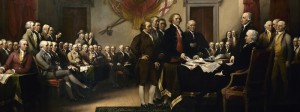 Many legislators have admitted they didn’t read the Affordable Health Care Act before voting on it. Instead, they took Nancy Pelosi’s bizarre advice: “But we have to pass the bill so you can find out what is in it, away from the fog of the controversy.” That line suggests a thought process right out of the Theater of the Absurd: This measure is controversial, but we’re going to postpone addressing the controversy until after we’ve read the measure, and we’re going to postpone reading it until we’ve passed it into a law binding on all Americans.
Many legislators have admitted they didn’t read the Affordable Health Care Act before voting on it. Instead, they took Nancy Pelosi’s bizarre advice: “But we have to pass the bill so you can find out what is in it, away from the fog of the controversy.” That line suggests a thought process right out of the Theater of the Absurd: This measure is controversial, but we’re going to postpone addressing the controversy until after we’ve read the measure, and we’re going to postpone reading it until we’ve passed it into a law binding on all Americans.
Reading the health care act wouldn’t have been quick or easy in any case. The original bill was 2400 pages; the final version, according to journalist Tom Giffey, a little over 900 pages. (The regulations written for its implementation are estimated to be 10,000 pages.)
But there is a more important question than what is going on in the murky depths of Pelosi’s mind or who read the bill and who didn’t. That question, which no one in the media seems to have asked, is:
Who WROTE the Affordable Health Care Act?
The answer is elusive. A number of names have been associated with the writing, including Dingell, Rangel, Waxman, Miller, Stark, Pallone, and Andrews in the House, and Baucus in the Senate. (Baucus has admitted he hadn’t read every page of the final legislation before voting.) The most likely answer is that it was written by a group of unelected congressional staff members, each bound to represent not the public good but the priorities of the particular members of Congress and their campaign contributors.
In other words, the Affordable Health Care Act was most likely written by a committee.
Now there may be some complimentary things to say about committees, but it’s easier to find disparaging ones. For example: “A committee is a thing which takes a week to do what one good man can do in an hour” (Elbert Hubbard); “To get something done a committee should consist of no more than three people, two of whom are absent” (Robert Copeland); and “We always carry out by committee anything in which any one of us alone would be too reasonable to persist” (Frank Moore Colby).”
Luke, my colleague and office mate for many years, shared that pessimism about committees. A fine poet and an eloquent speaker, Luke taught writing and literature. One of the requirements for advancement at our college was “university service,” which translated to service on committees. Each year our annual reports had a space to list our committee work, and each year Luke would write in that space, in exquisite penmanship, “I have no stomach for this sort of thing.”
He wasn’t a lazy person. Far from it—if asked, he would do the work of an entire committee by himself. But he refused to suffer long hours with a group that all too often included the uninformed, the arrogant, and/or the disinterested. Experience had taught him that such an assembly seldom produces insights or solutions to problems. His punishment for avoiding committee work was to be denied promotion year after year, and he bore that burden with dignity.
Luke could hardly have anticipated that the entity he found so repulsive would in time threaten the economic stability of the nation, but I suspect he would not have been surprised by the development.
To say that committees tend to be inefficient and unproductive does not mean all committees are necessarily so. It is possible for a committee to produce genuine and even elegant solutions to problems but only under these conditions:
- Members must have expertise and interest in the problem under consideration.
- They must be committed to entertaining all possible solutions and to embracing the best one, whether or not it flatters their prior views or scores political points.
- They must be under no pressure to compromise their objectivity and integrity.
In order for the Affordable Health Care committee to have met these conditions, it would have had to included, as prominent members or consultants, experts in these areas: (a) delivering health care (physicians and hospital administrators), (b) measuring the economic impact of reform proposals (economists and actuaries); and (c) assessing the legality of proposals (professors or practitioners of constitutional law). Furthermore, those experts would have to have been selected for their intellectual independence and integrity and their ability to avoid pressure tactics by others.
We cannot know for sure whether members of the committee that wrote the Affordable Health Care Act met these criteria because their names have not been revealed. But the fact that many respected physicians, economists, and constitutional experts have publicly identified glaring errors of judgment in the Act suggests that the criteria were not met.
What conclusion can be drawn from all this? That in all likelihood the new health care program, which represents a cost of over 17% of the U.S. gross domestic product and is rising rapidly, was not only unread by our legislators but written by a group of unelected nonexperts who owe allegiance, at least indirectly, to lobbyists and special interest groups. It is hard to imagine a more powerful prescription for disservice to the American people and fiscal disaster.
The consequences of the Affordable Health Care Act should certainly concern us. But we should be every bit as concerned about the process that produced it and other legislation.
Copyright © 2013 by Vincent Ryan Ruggiero. All rights reserved
